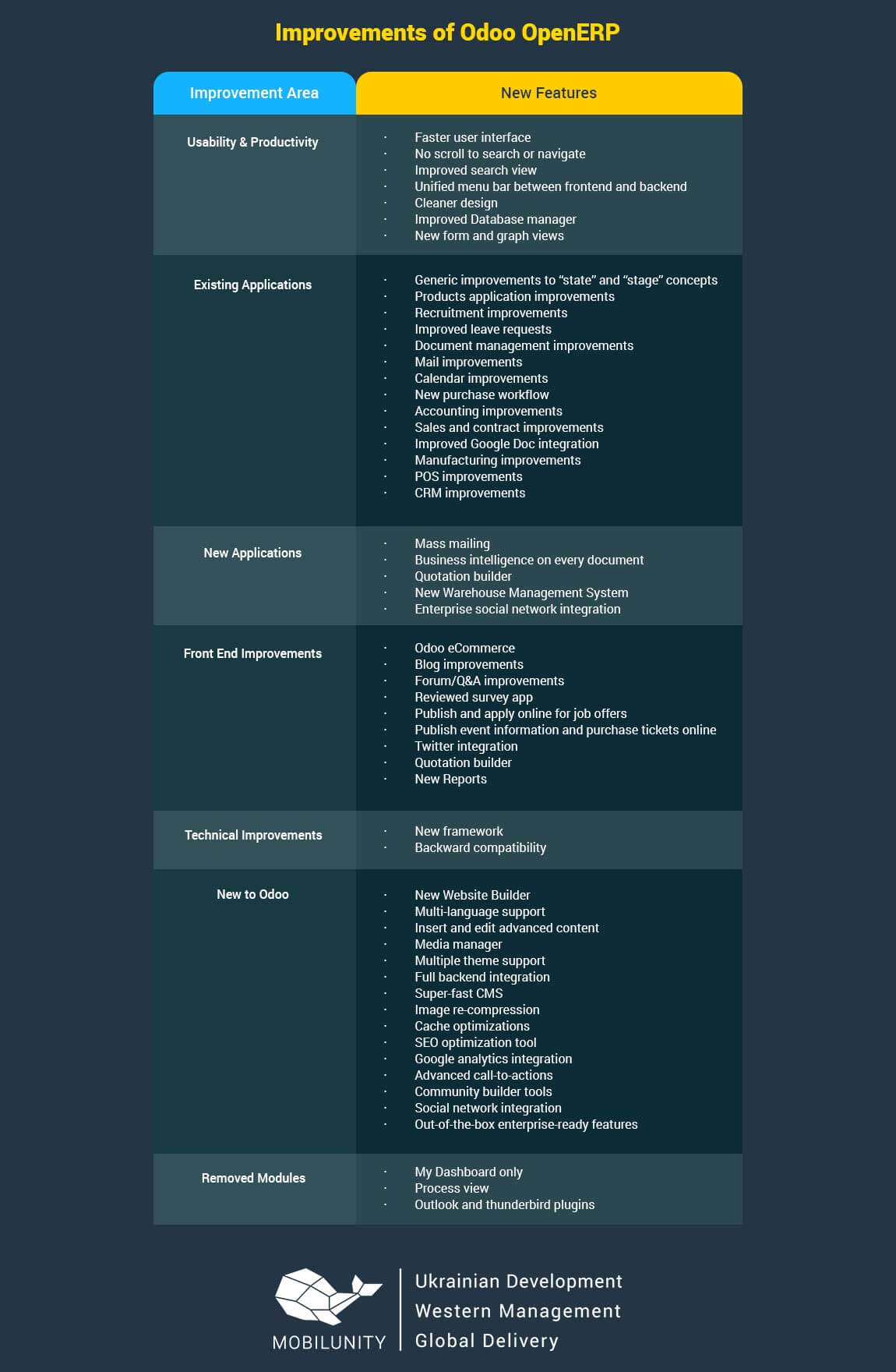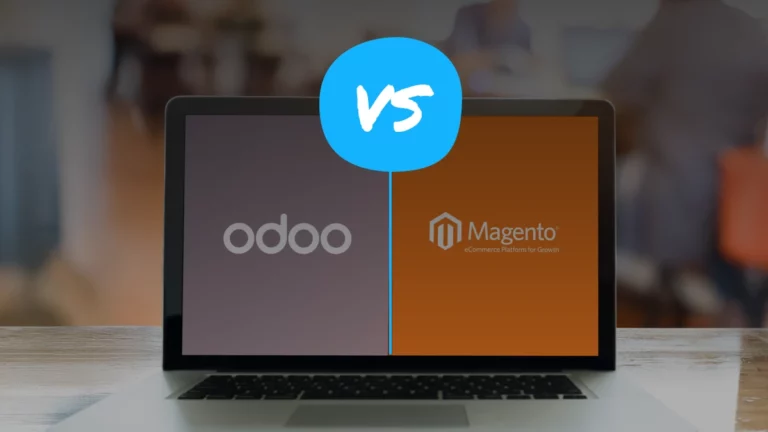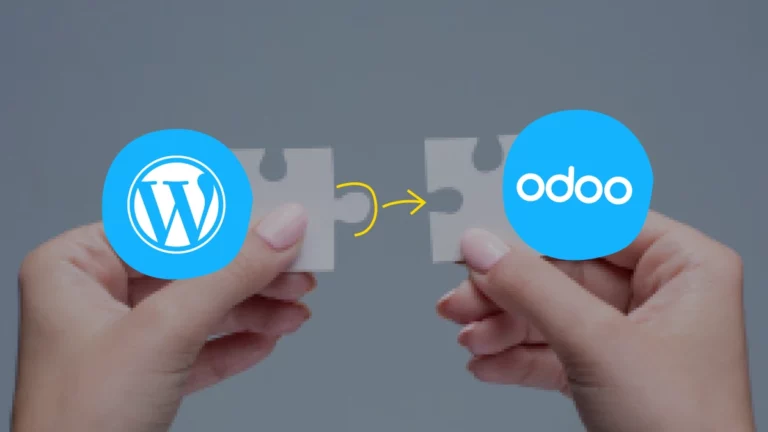Odoo vs OpenERP: Comparison of These Systems
The introduction of OpenERP to the enterprise management market and OpenERP Odoo developers came from a man by the name of Fabien Pinckaers. With a strong motivation to take over the world of enterprise management, Pinckaers developed the open source software into a powerful product that continued to evolve over the years. As the product grew, so did Pinckaers ideas. In May 2014, Pinckaers renamed OpenERP to Odoo and the product opened doors to even more opportunities for small and large businesses. Named the fastest growing company in Belgium, Odoo is projected to continue its growth in the future. There is no telling where Odoo will go as you look back at where it came from when it was OpenERP.
Developers Move Beyond the Limits of ERP: Odoo vs OpenERP

ERP, or Enterprise Resource Planning, is a software that integrates the functions necessary to run a business into one complete system. The ERP system helps streamline processes and data across an entire organization for more efficient and secure business flows. When you implement the best ERP system, you will watch it transform you into a more unified and productive business.
Throughout the years, many different companies offered ERP website options to create a shared database that allowed you to more effectively manage your everyday operations. The top ERP solutions could help management become more efficient across the board with inventory management, accounting, human resources, open-source CRM, manufacturing, sales, and more. From its roots back in the 1960s, ERP has evolved into examples like Odoo and OpenERP that users turn to more frequently today.
When Pinckaers developed OpenERP, his goal was to build an empire that would lead the market in business solutions. OpenERP was the starting point, beginning with the development of dozens of modules, and used through 100 countries. Its success knocked out SAP, their closest competition, as OpenERP hit 2 million users worldwide in 2013. With bigger goals in sight, Odoo OpenERP was developed to reduce the limitations that restrict the name OpenERP to ERP functions.
Comparing OpenERP 7 vs Odoo 8
OpenERP 7 was the final version before the development of Odoo OpenERP 8.0. Odoo 8 vs OpenERP 7 is of no comparison when it comes to features and functionality. The chart below demonstrates the improvements of Odoo OpenERP 7 as released by Odoo version 8:
As new versions of Odoo are released, improved features allow for better user experience, new applications, and improvements to existing applications. Odoo also added the Community vs Enterprise editions to their ERP systems. As featured in Odoo 9, the first Enterprise edition featured more functionality and nicer user interface out-of-the-box, faster user interface, and upgrades and supports included by the vendor. With the addition of new applications, OpenERP 7 vs Odoo 9 show significant improvements along with the addition of new features and functionality. Odoo OpenERP 7 now seems to be a thing of the past as Odoo 11 was released in October 2017.
Odoo OpenERP Integration
There are many benefits to integrating Odoo into your business management practices. The suite of applications offers over 1,000 modules to improve your business processes. The open-source characteristics of Odoo make integration easy as the source code is available to anyone at no cost. Additionally, developers can modify the software with improved features and functionalities because of its open-source capabilities. This means performance is always at its best as developers bring their unique skills, ideas, and expertise to the table.
While Odoo and OpenERP do have some difference, OpenERP vs Odoo integration shares the same benefits. These include:
- A comprehensive solution that has the features and functionalities needed to fulfill all the requirements and necessary to make it a complete system for your business processes.
- A platform that is modular which means that you can start with the basics and add to your modules later as they are needed.
- The advantage of an open-source nature that makes updated technology a constant improvement to the platform.
- Cost savings is a large benefit as well. While some ERP platforms require that you buy the software, Odoo and OpenERP offer the license for free. This leaves you with the ability to spend more money on implementation and customization as your business needs.
Both Odoo and OpenERP are easily integrated. Integration is easy to configure, and both can be easily integrated into third-party ERP sources. The ease of integration with other ERPs allows for the most efficient solutions for your OpenERP Odoo CRM. The platform is highly flexible and offers great ease of customization. Regardless of the size and industry of your business, you can customize the ERPs with the help of ERP developers to meet your unique business requirements. And, the platform is easily downloaded for free.
[blog-banner]
The latest versions of Odoo continue to improve the productivity, functionality, and efficiency of businesses all over the world. What started as the up and coming ERP solution with OpenERP has moved into new territories beyond ERP with the emergence of Odoo. Odoo will continue to transform OpenERP with over 4,500 apps and the mission to “make companies better, one app at a time.” There is no comparison when it comes to making a decision to choose OpenERP or Odoo. Implementing Odoo for your business, or upgrading to Odoo from OpenERP, is not only the logical choice for increased efficiency, but it will also greatly improve your business. Also you can get a highly professional development services and hire BigCommerce developers for your online stores and shopping cart solutions!














